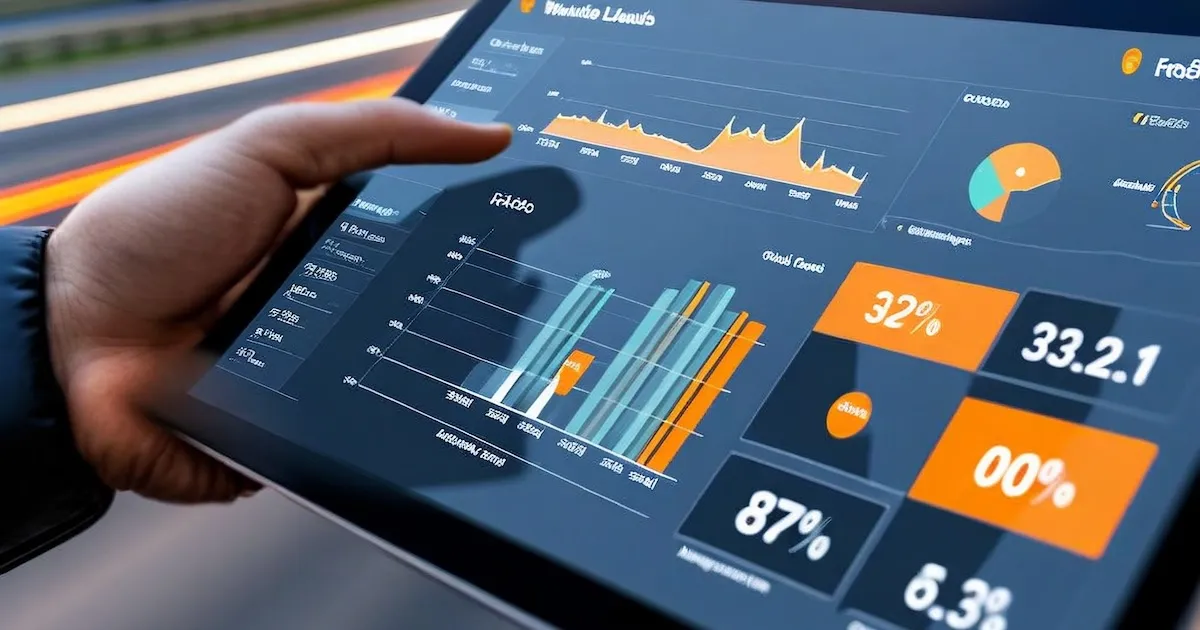
How Accurate Fleet Reporting Helps Cut Fleet Costs
Why Fleet Reporting Saves Money
Fleet reporting is more than just data collection — it is a strategic advantage. When every route, refill, and repair is tracked in real time, fleet operators gain the insights they need to reduce waste and streamline operations. In a high-cost, high-urgency industry, that visibility can mean the difference between margin and loss.
From controlling fuel spend to catching maintenance issues before they escalate, detailed fleet reporting gives businesses the tools to take action before costs spiral. For operators managing vehicles across the country, real-time intelligence is no longer optional — it is essential.
Fleet managers know that not all expenses are obvious. It's the slow leaks — unnoticed idle time, inefficient routes, unauthorized purchases — that add up over time. Reporting shines a light on those gaps, helping you regain control over your fleet administration without sacrificing scale, speed, or service.
What Is Fleet Reporting?
Fleet reporting refers to the use of software, telematics, and dashboards to monitor, analyze, and manage every moving part of your operation — from vehicle usage to driver behavior. It transforms thousands of daily touchpoints into clear, actionable fleet management reports that support smarter decisions.
When implemented effectively, it bridges the gap between the field and the office — empowering managers with the knowledge to reduce costs, ensure safety, and optimize performance.
It also standardizes how information is shared across the organization. Whether it is a dispatcher reviewing routes or a finance team reconciling expenses, everyone uses the same system and the same data. That shared access reduces miscommunication and speeds up problem-solving.
How Better Visibility Helps You Save
The value of accurate fleet data lies in what it reveals. With real-time tracking, you can spot inefficiencies instantly—whether it’s fuel waste, delays at truck stops, or consistently underperforming vehicles. The faster you identify a problem, the faster you can fix it.
Fleet reporting helps you:
- Compare fuel usage across routes or drivers
- Monitor idle time, speeding, and unauthorized stops
- Forecast maintenance needs based on real metrics
- Track spend across vehicles in a centralized system
Better data clarity means better control — and that translates directly into cost savings.
Key Ways Fleet Reporting Reduces Costs
1. Minimize Fuel Waste with Usage Insights
Fuel prices fluctuate constantly, making it critical to understand exactly how your resources are used. With fleet analytics, fleet operators can compare fuel consumption by route, vehicle, or driver, and take corrective action when outliers appear.
Pair that with AtoB’s fleet fuel discounts — offering up to 25¢ off per gallon, fraud detection, and real-time controls — and you turn your data into measurable savings.
2. Spot Maintenance Risks Before They Disrupt
Recurring repair issues often follow subtle trends: increased tire wear, brake warning lights, and oil alerts. A reliable reporting system identifies these trends early, helping you schedule preventive maintenance instead of reacting to emergencies.
With automated alerts based on mileage or usage, you reduce downtime and keep your fleet road-ready. This proactive approach not only improves safety but also extends the lifecycle of your most valuable assets—your vehicles.
3. Cut Down on Admin Hours with Automation
Manual reporting wastes time and often results in errors. With automated fleet management software, reports are generated in seconds, whether you are preparing for audits or monthly planning.
This frees up your team to focus on higher-value work instead of digging through spreadsheets. It also improves accuracy and helps ensure your reports are audit-ready, should a client, partner, or agency require supporting documentation.
Time-Saving Tools That Drive Efficiency
Real-Time Dashboards
Modern fleet dashboards allow operators to track all vehicles at once—location, refueling stops, active alerts, and more—all in one place. AtoB’s easy-to-use dashboards sync fuel usage and driver activity into a single system for fast decisions and faster results, whether you are managing local fleets or over-the-road trucks across multiple regions.
Custom Alerts and KPIs
Build requirements around what matters to your business — idle thresholds, max fuel spend, route adherence. Alerts keep your team accountable and give you immediate insights into potential cost leaks.
Examples of smart alerts:
- Driver exceeds fuel capacity
- Vehicle idles for more than 10 minutes
- Truck deviates from approved route
These tools not only track what happens — they also help you identify trends and anomalies before they become financial risks.
Built-in Compliance Support
Failure to meet Federal or local compliance standards can result in hefty fines. AtoB’s reporting tools help log hours, organize inspection history, and maintain digital audit trails to stay ahead of compliance.
Automating reporting also helps ensure you meet evolving requirements set by any agency that oversees commercial vehicle operations.
That means fewer fines — and more time to focus on what matters.
Implementing Fleet Reporting for Maximum ROI
Align Tools With Business Goals
Before rolling out a reporting platform, define success. Do you want to lower fuel spend, improve uptime, or simplify compliance? Choose tools that align with those needs, including GPS tracking, spend control cards, and fleet performance analytics.
Involve Your Team
Technology only works if your team knows how to use it. Train staff across departments to access dashboards, interpret metrics, and apply what they learn. When drivers, dispatchers, and analysts share the same information, it leads to faster action and better results.
Start with basic reporting reviews, then encourage each role to dig deeper — drivers reviewing their driving habits, finance reviewing spend records, and operations teams reviewing asset use and downtime.
Make Reporting a Routine
When your fleet operations follow a predictable rhythm of review and action, your team is empowered to improve both performance and safety over time.
Set weekly or monthly review cycles to track progress and uncover new insights. Even stable metrics can reveal hidden opportunities to optimize resources or schedule improvements.
Cut Costs and Run a Leaner Fleet
The Bottom Line
When you track your data, you control your outcomes. Fleet reporting allows operators to:
- Reduce fuel expenses
- Stay ahead of maintenance
- Avoid compliance penalties
- Centralize operations and cut admin work
With centralized data, customized alerts, and user-friendly reporting features, the AtoB fuel card is built to improve operations, reduce manual workload, and support better decision-making at every level.
Get started with AtoB



.jpg)
